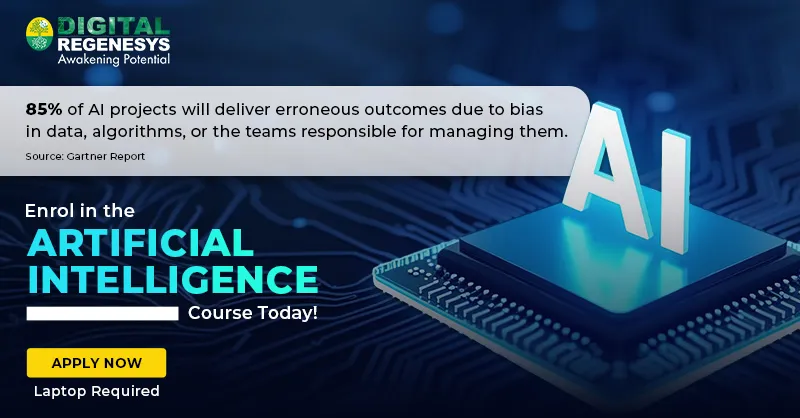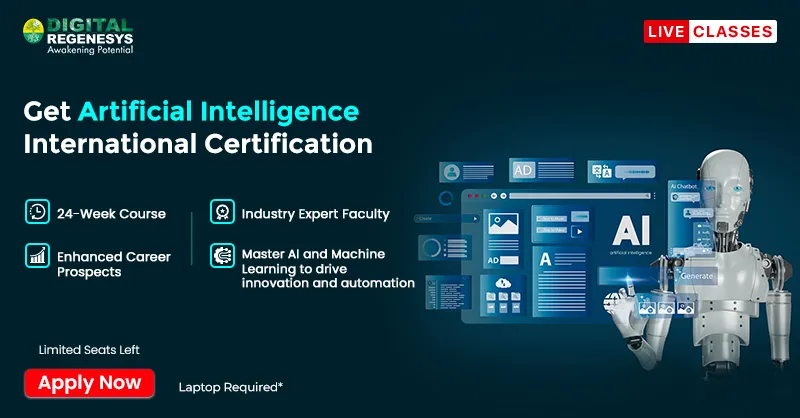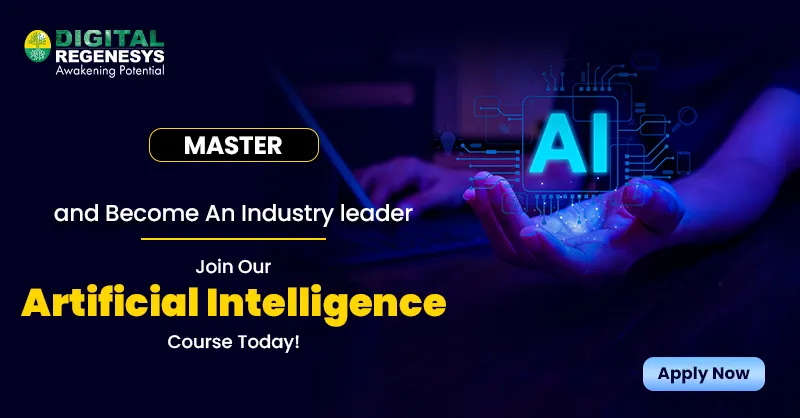What You Will Learn in a 24-Week Artificial Intelligence Online Course

Artificial Intelligence (AI) has moved from research labs into everyday business and operational environments, becoming a critical driver of innovation across sectors. From automating routine workflows to analysing vast datasets and predicting market trends, AI is reshaping industries worldwide. Professionals and students equipped with practical AI knowledge are in high demand, with organisations seeking talent that can apply AI to solve complex problems.
In this article, we will explore the full module structure of a 24-week AI course, practical applications, career prospects, and the skills learners gain throughout this comprehensive AI programme.
Who Should Enrol for an AI course?
The Digital Regenesys 24-Week Certification Course in Artificial Intelligence caters to a diverse range of learners seeking practical, career-focused skills in artificial intelligence. Through structured modules and hands-on projects, each participant gains practical experience that can be applied immediately to real-world challenges, ensuring that learning translates directly into professional impact.
Some learners who can benefit from this IITPSA-accredited course include:
- Students – Gain foundational AI knowledge early to enhance employability and build a competitive edge in the job market.
- Professionals – Develop specialised AI skills to transition into new roles or accelerate career growth within your current field.
- Corporate Teams – Equip employees with AI expertise to drive innovation, improve operational efficiency, and support data-driven decision-making within the organisation.

Introductory Modules
The introductory stage is designed for learners with no prior experience in programming or AI, providing a strong foundation in coding and data handling. These modules emphasise practical exercises to ensure that participants can apply theoretical concepts in real-world scenarios.
Modules include:
- Programming Foundations for AI – Introduces Python programming essentials, including variables, control structures, and basic data manipulation.
- Applied Programming for AI – Provides hands-on exercises to implement Python concepts in AI applications.
Learning outcomes:
- Write Python code confidently for data handling and analysis.
- Understand basic data structures and algorithms.
- Apply coding skills to simple AI tasks, such as data cleaning and preliminary analysis.
Read more on Programming Foundations for Artificial Intelligence here
Intermediate Modules
Building on the foundational programming skills gained in the introductory stage, the intermediate modules guide learners through the practical application of machine learning and predictive analytics. This stage is designed to progressively develop the ability to analyse data, identify patterns, and make informed predictions – skills that are central to real-world AI applications.
Modules include:
- Predictive Modelling with Regression – Learn to forecast numerical outcomes using linear and non-linear regression methods, translating raw data into actionable predictions.
- Predictive Modelling with Classification & Clustering Techniques – Develop models that categorise data, detect patterns, and segment datasets to generate business insights.
Applications in practice:
- Use regression models to predict sales trends or customer behaviour.
- Apply classification techniques for credit scoring or risk analysis in finance.
- Employ clustering methods for customer segmentation and targeted marketing in retail.
Key takeaways:
- Build practical, industry-ready machine learning models.
- Translate complex data patterns into clear, actionable insights.
- Progressively tackle real-world problems using predictive analytics, preparing for advanced AI applications in later modules.
Read more on What are the Best Jobs in Artificial Intelligence? here

Advanced Modules
The advanced AI modules at Digital Regenesys introduce learners to more sophisticated AI concepts, building on the programming and predictive modelling skills acquired in earlier stages. This stage equips participants to tackle complex problems and develop AI solutions for real-world applications across multiple industries.
Modules include:
- Deep Learning & Neural Architectures – Learn to design, build, and train neural networks for tasks such as image recognition, speech analysis, and predictive modelling.
- Natural Language Processing & Computer Vision – Explore advanced AI techniques to process text and visual data, enabling the development of intelligent systems such as chatbots, automated document processing, and object recognition applications.
Practical applications:
- Apply deep learning to medical imaging, anomaly detection, and predictive maintenance.
- Use NLP for sentiment analysis, automated customer support, and document summarisation.
- Implement computer vision for surveillance, quality checks in manufacturing, or retail analytics.
Learning outcomes:
- Gain a deep understanding of neural network structures and functionalities.
- Develop AI models that can process and interpret textual and visual data.
- Apply advanced AI techniques to solve complex business and technological challenges, preparing for specialised applications in self-paced modules.
Self-Paced Modules
The self-paced modules provide learners with the opportunity to specialise in specific AI subfields and explore advanced applications at their own pace. These modules are designed to deepen practical expertise, allowing participants to focus on areas that align with their career goals or organisational needs.
Modules include:
- Applied Natural Language Processing
- Leveraging Hugging Face NLP Pipelines
- Automated Text Summarisation Techniques
- NLP-Driven Recommendation Systems
- Applied Computer Vision
- Real-Time Object Detection Methods
- Intelligent Object Tracking in Video Streams
- Human Pose Estimation and Analysis
- Applied Time Series Analysis
- Fundamentals of Time Series Data
- Time Series Manipulation Using Pandas
- Statistical Modelling Techniques for Time Series
- Deep Learning Models for Time Series Forecasting
Applications and benefits:
- Develop recommendation engines to enhance user experience in e-commerce platforms.
- Implement real-time object detection for security, logistics, or industrial monitoring.
- Analyse temporal data to forecast trends in finance, healthcare, or energy sectors.
- Automate text processing tasks for media, research, or customer experience solutions.
By completing these self-paced modules, learners gain specialised skills that can be directly applied in the workplace, empowering them to tackle complex AI challenges and contribute to strategic decision-making within their organisations.
Read more on History and Evolution of Artificial Intelligence here

How Can AI Learning Be Applied?
The skills acquired through the Digital Regenesys 24-Week AI Online Course can be applied across a wide range of industries, enabling learners to solve real-world problems and drive organisational success. By combining foundational programming, predictive modelling, deep learning, NLP, and computer vision, participants gain the tools to implement AI solutions effectively.
Listed below are some industries where AI can be effectively applied:
Healthcare – AI is revolutionising patient care and clinical operations. Learners can develop models for diagnostics, patient monitoring, predictive health analytics, and treatment optimisation. For example, AI can analyse medical imaging to detect anomalies or forecast patient readmissions, supporting faster and more accurate decision-making.
Finance – AI applications in finance enhance security, efficiency, and strategic planning. Skills gained from this course allow learners to build systems for fraud detection, credit scoring, risk assessment, and portfolio optimisation. By interpreting large datasets, AI enables financial institutions to make more informed decisions and enhance operational resilience.
Retail – AI drives more intelligent business decisions in retail, enabling personalisation and efficiency. Learners can create recommendation engines, perform customer segmentation, and optimise inventory management. These applications enhance the customer experience, increase sales, and lower operational costs.
Manufacturing – AI applications in manufacturing streamline processes and improve productivity. Learners can implement predictive maintenance systems, automate quality control, and optimise production workflows. These solutions reduce downtime, minimise errors, and support data-driven operational improvements.
Read more on What is Artificial Intelligence in Project Management? here
Conclusion
The 24-Week Artificial Intelligence Online Course at Digital Regenesys provides a comprehensive, hands-on learning journey for students, professionals, and corporate teams. From foundational programming to advanced neural networks, NLP, computer vision, and specialised applications, learners acquire practical skills and real-world experience. By completing this course, participants will be prepared for AI-focused careers and equipped to implement AI solutions across various industries.
Begin your AI journey today with the Digital Regenesys Artificial Intelligence Course and gain skills that will shape your professional future. Visit the Digital Regenesys website and enrol in our accredited AI course today!
Last Updated: 19 November 2025
